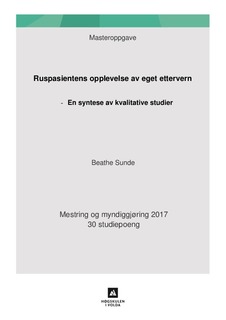Ruspasientens opplevelse av eget ettervern. En syntese av kvalitative studier
Master thesis
Permanent lenke
http://hdl.handle.net/11250/2506024Utgivelsesdato
2017Metadata
Vis full innførselSamlinger
- Helse- og sosialfag [55]
Sammendrag
Summary
This paper is based on a meta-ethnografic analysis of nine qualitative studies. The experience of 335 Scandinavian informants is explored to analyse how recovery from substance abuse is described post treatment.
The aims of this study were: (1) To analyse existing user knowledge about what promotes recovery. (2) To examine if the informants perception of addiction is connected to how well they cope and recover from substance abuse.
Recovery is described both as a prosess and a goal, towards better health and wellness. The process is expressed as a self defined non-linear journey towards wellness and a better quality of life. The drug patients aftercare program is adjusted to his or her needs, and seen as a valuable support for those who need it. Coping post treatment is determined largely by factors related to the patient’s socioeconomic status and psychosocial functioning. Few of the informants describe their addiction as a cronic illness with somatic symptoms at this point. The findings in this study indicate that years are normally spent adapting to what is described as a new way of life and a new version of themselves. New reforms have created a shift in how substance abuse is addressed and highlights user needs as a leading indicator for service efficiency and quality. Contemporary recovery research is used as a theoretical frame to address how coping from substance abuse is described both as a process and as a new goal for the new services. The informant’s stories indicate that after their somatic symptoms are addressed the patient’s emotional, mental and social wellbeeing needs attending to keep the addiction at bay.
